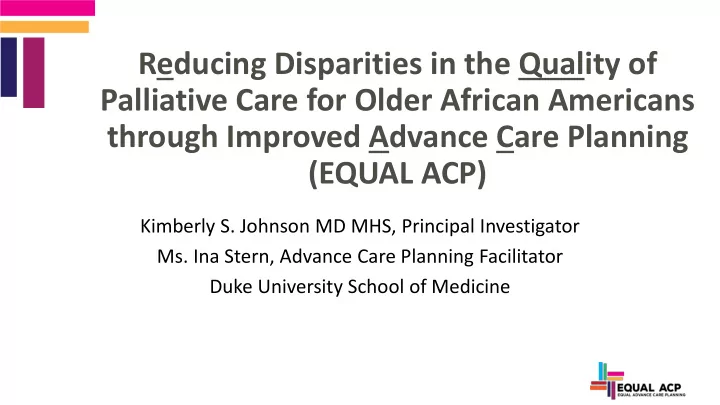

Reducing Disparities in the Quality of Palliative Care for Older African Americans through Improved Advance Care Planning (EQUAL ACP) Kimberly S. Johnson MD MHS, Principal Investigator Ms. Ina Stern, Advance Care Planning Facilitator Duke University School of Medicine
What is Advance Care Planning (ACP)? • ACP is making decisions about the healthcare you would want in the future if you happen to become too sick to speak for yourself. • Sharing values and goals with loved ones and healthcare providers • Deciding what treatments you would or would not want • Completing advance directives • Treatments you would or would not want • Who you choose to make decisions for you
ACP IS GOOD FOR PATIENTS & FAMILIES • More likely to get the care they want • More likely to die with hospice • Less likely to spend last months in hospital • Communication with doctors is better • Caregivers are less depressed, stressed and anxious after their loved one dies
African Americans are less likely to participate in ACP
ACP as a way to improve care for African Americans • African Americans experiences lower quality care at the end-of-life than Whites. • ACP may improve care in many areas where African Americans experience lower quality • Communication with providers • Care consistent with preferences • Hospice Use • Overall Satisfaction
African Americans have positive attitudes about ACP “There should be a point where you talk about what to do in the future. … before he needs a breathing tube.” “We had talked about it. So that made it easier. The doctor asked me about putting him on the ventilator, I said no. He didn’t want that.” African-American Caregivers
Barriers to ACP Theme Topics and Quotes Discomfort People are not comfortable or ready to talk about it. Lack of Knowledge People do not know what an advance directive is. Spiritual Beliefs Religious Beliefs are Important Trust People do not trust the medical community. Relationship with Physicians are always rushing and you don’t feel any physician compassion from the physician.
EQUAL ACP: Goals and Questions Goal: Create opportunities for older adults with serious illness to participate in ACP and to reap the benefits. Key Questions • What is the best way to help older African Americans and Whites to discuss and write down their wishes for care? • What is the best way to close the gap in advance care planning between African Americans and Whites? • What is the best way to close the gap between African Americans and Whites in the quality of end-of-life care?
HOW WILL THE STUDY BE CONDUCTED? FOLLOWED 1 YEAR 800 ADULTS to determine if 10 CLINICS; 5 STATES THE STUDY AGE 65 OR OLDER they participate in (AL, GA, TX, NC, SC) WILL LAST FOR with serious illness ACP (write down or 5 YEARS (half African-American) discuss wishes)
Study Design: Comparative Effectiveness COMPARING 2 WAYS TO INCREASE ACP VS. FIVE WISHES FORM RESPECTING CHOICES Patient-Driven Approach Structured Approach • Patients receive an easy to read form ACP facilitators leads 60 to 90 minute which allows them to discuss/write down conversation with patients and their their wishes. caregivers. • ACP facilitator follows up by phone.
ACP and Shared Decision Making (SDM) Patients Families Healthcare Provider SDM • Beliefs • Diagnosis Treatments • Values • Prognosis • Goals Proxy • Treatments--benefits, • Preferences Advance and burdens • Knowledge Directives
African Americans Experience Lower Quality SDM Patients Families Healthcare Provider • Beliefs • Diagnosis • Values MISTRUST • Prognosis • Goals • Treatments--benefits, POOR • Preferences COMMUNICATION and burdens • Knowledge
ACP Facilitators: How do we improve SDM? • How can nonhealthcare providers or ACP facilitators improve SDM? • Does race matter? • Shorter visits, less positive affect, less relationship building, less information • EQUAL ACP Facilitators • ½ African American ; ½ White “African Americans need information from a trustworthy source. This involves learning from peers, someone that “is like me”. African American community member
Different Model of SDM
Experience of ACP Facilitator
Improving Shared Decision Making in ACP: What Really Matters? • Creating Trust • Listening without Judgment • Affirmation and Acceptance not Agreement • Asking Permission—Fostering Relationships • Curiosity even when uncomfortable • Empathy • Addressing desires and fears
Acknowledgements • PCORI • EQUAL ACP Research Team • ACP Facilitators • Patients/Families
Recommend
More recommend